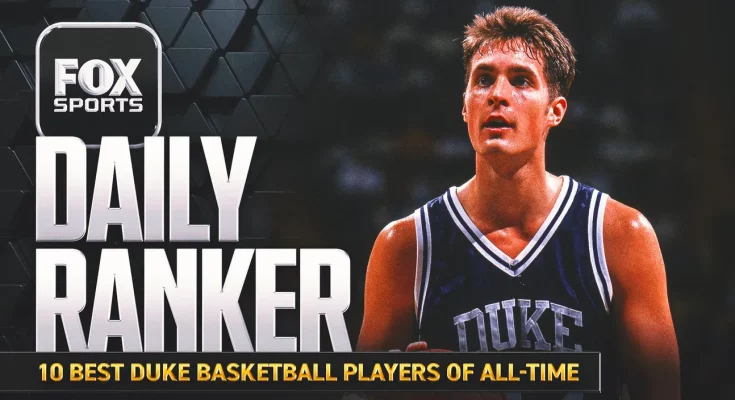Duke University has long stood as one of the most prestigious programs in college basketball history. From the hardwood glory days under head coach Mike Krzyzewski to the dominance of elite one-and-done freshmen in the modern era, Duke has consistently produced talent that’s left a lasting legacy both in the NCAA and the NBA. Selecting the ten best players in Duke basketball history is no easy task. The program has seen dozens of All-Americans, countless first-round NBA Draft picks, and a plethora of unforgettable March Madness performances. However, when evaluating based on individual performance, leadership, impact on Duke’s success, and subsequent basketball careers, a clear group of ten emerges from the storied archives of Cameron Indoor Stadium.
Leading the list is Christian Laettner, widely regarded as the most accomplished player in NCAA tournament history. His Duke tenure from 1988 to 1992 was nothing short of legendary. Laettner reached four straight Final Fours, won two national championships, and was named the Most Outstanding Player of the 1991 NCAA Tournament. His iconic game-winning shot against Kentucky in the 1992 East Regional Final remains one of the most replayed moments in college basketball history. Laettner also finished his college career with over 2,400 points and nearly 1,000 rebounds, securing his place not only as Duke’s best player but arguably one of the greatest in college basketball history.
Grant Hill was the embodiment of versatility, athleticism, and poise during his time at Duke from 1990 to 1994. Hill contributed significantly to Duke’s 1991 and 1992 national titles and was the centerpiece of the Blue Devils’ run to the 1994 NCAA Championship game. What set Hill apart was his ability to defend all five positions and control the pace of the game. He could pass, rebound, shoot, and defend with elite efficiency, and he displayed leadership and unselfishness throughout his collegiate career. His transition to the NBA was stellar as well, with Hill becoming a multi-time All-Star and one of the league’s top players before injuries derailed his prime.
JJ Redick ranks as one of the most prolific scorers and best shooters in college basketball history. Playing from 2002 to 2006, Redick left Duke as the school’s all-time leading scorer with 2,769 points. He was a two-time ACC Player of the Year and won the 2006 National Player of the Year award. Redick’s long-range shooting ability forced defenses to adapt in unprecedented ways, and his intensity on the court matched his relentless pursuit of greatness. Although he never won a national title, Redick’s individual dominance and transformation of the shooting guard role at the collegiate level makes him a top-tier Duke legend.
Bobby Hurley’s tenure at Duke from 1989 to 1993 was defined by toughness, vision, and clutch playmaking. As the point guard during Duke’s back-to-back championship seasons in 1991 and 1992, Hurley holds the NCAA record for most career assists and was named the Most Outstanding Player of the 1992 Final Four. His floor leadership and fearless style allowed Duke to play at a high tempo while remaining in control. Hurley’s fiery personality, ability to knock down big shots, and knack for making the right pass at the right moment solidified him as the heartbeat of Duke’s early ’90s dominance.
Shane Battier was the quintessential leader and glue guy during his years from 1997 to 2001. His contributions were not always flashy, but they were vital. Battier led Duke to the 2001 national title and won multiple National Player of the Year awards that same season. Known for his defensive prowess, high basketball IQ, and humility, Battier set the tone for a team-first approach and left Duke as one of its most respected leaders. He is still remembered for his ability to take charges, lock down opposing stars, and make the hustle plays that don’t always show up in stat sheets but win championships.
Zion Williamson’s time at Duke was brief but electric. In the 2018–2019 season, Williamson took the basketball world by storm with his jaw-dropping athleticism, strength, and charisma. Despite playing only one collegiate season, he won the Naismith College Player of the Year, the Wooden Award, and the AP Player of the Year. He averaged 22.6 points and 8.9 rebounds per game while shooting an absurd 68% from the field. Zion became a cultural phenomenon, with his every dunk and blocked shot going viral. Though Duke fell short of the Final Four, Williamson’s impact on the program, NCAA viewership, and recruiting was seismic.
Elton Brand provided the perfect blend of power and skill during his two years at Duke from 1997 to 1999. He was the anchor of the team that went 37–2 during the 1998–1999 season, winning the consensus National Player of the Year award. Brand was a force in the paint, averaging over 18 points and 9 rebounds per game in his sophomore year. He was the first player in Duke history to be selected No. 1 overall in the NBA Draft. Brand’s low-post dominance, combined with his efficiency and leadership, helped elevate Duke to new levels of success during his short but unforgettable tenure.
Johnny Dawkins was the first true superstar under Coach K and laid the foundation for the dynasty that would follow. Playing from 1982 to 1986, Dawkins scored over 2,500 points in his career and was named the Naismith National Player of the Year in 1986. He led Duke to the NCAA title game that year, falling just short to Louisville. Dawkins’ ability to score off the dribble and his steady demeanor helped legitimize Duke as a national power and earned him a special place in program history. After his playing career, he also returned to Duke as a respected assistant coach.
Jay Williams was a dazzling talent at point guard during his time at Duke from 1999 to 2002. He led the Blue Devils to the 2001 national championship and was named National Player of the Year in 2002. Williams was known for his incredible speed, clutch shooting, and leadership. He scored over 2,000 points in just three seasons and hit numerous big shots, including a legendary game-tying three-pointer against Maryland in 2001. Tragically, a motorcycle accident ended his NBA career prematurely, but his contributions at Duke remain etched in the annals of college basketball greatness.
Lastly, Danny Ferry was one of the most complete players in Duke history. From 1985 to 1989, Ferry showcased a unique skill set as a forward who could handle the ball, shoot from range, and pass like a guard. He earned multiple All-American honors and was the Naismith College Player of the Year runner-up in 1989. Ferry finished his college career with over 2,000 points and 1,000 rebounds and helped lead Duke to three Final Four appearances. His versatility and leadership helped establish Duke as a dominant force heading into the 1990s.



